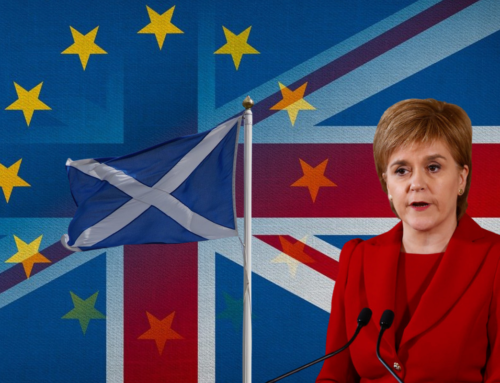
by Brendan Donnelly
Director, The Federal Trust
1st February 2019
Four conclusions emerge from the series of votes on Brexit in the House of Commons this week (29th January):
• First, this government is so paralysed by internal division that it is incapable of pursuing any coherent policy in the negotiations. As long as it is in office but not in power, the UK is therefore on track to leave the EU on 29th March 2019 with “no deal.”
• Second, there is a majority of MPs, probably a significant majority, who wish to avoid the UK’s leaving the European Union without a Withdrawal Agreement.
• Third, this majority is not yet willing or able to impose its will on a government that runs the risk of bringing this about.
• Fourth, tensions and divisions within the major parties will make it difficult, although far from impossible, for Parliament to impose its will on the government before the end-March deadline. The possibility of the UK’s leaving the EU in two months with “no deal” having been agreed remains as high as ever. Whether this anarchic event occurs will depend on the interaction between the above distinct and contradictory conclusions emerging from this week’s vote.
The divisions within the Conservative government and Party have long bedevilled progress in the Brexit negotiations. These led to the original improvident triggering of the Article 50 notification; to the reckless establishment of Theresa May’s “red lines” that have constrained the entire negotiating process; to the wholesale resignations over the past two years of Conservative ministers responsible for carrying out the Brexit negotiations; and now to the Prime Minister’s incapacity to persuade her Party to accept her proposed Withdrawal Agreement (WA), so painfully negotiated with the EU. It is a sad but fitting culmination of this process that the Conservative Party and its supportive press have welcomed so enthusiastically the adoption by MPs of Sir Graham Brady’s fantasy-laden amendment calling for the renegotiation of the central, Irish element of the WA. There is no chance of this being acceptable to the EU.
It is, however, only around such shared and incoherent delusions that the Conservative Party is capable of even temporary unity. As 29th March approaches, this internal dysfunction will point ever more ineluctably towards British withdrawal from the EU in the most chaotic and catastrophic circumstances possible.
MPs concerned by the prospect of a “no deal” Brexit must have been bitterly disappointed that the only amendment to the government’s motion favourable to their cause that won a majority was that put down by the Conservative Caroline Spelman and Labour’s Jack Dromey. This amendment is general in character, its rejection of Brexit without a Withdrawal Agreement is not legally binding on the government and it passed by just eight votes. Many observers believe that this small majority greatly understates the number of MPs, particularly Conservative MPs, prepared at a later date to vote against the prospect of “no deal.” The Prime Minister promised a further vote on her WA in mid-February; there are indications that many Conservative MPs are biding their time until then. A number of Conservative Cabinet Ministers, including Amber Rudd and David Gauke, have reportedly warned Mrs. May that she only has two weeks left to assuage their fears relating to the possibility of “no deal.” If these Cabinet ministers were to resign in mid-February, they would act as a rallying-point for many of their Conservative colleagues.
Which way forward?
But if Tuesday’s votes are consistent with the continuing existence of a majority of MPs opposed to a “no deal” Brexit, MPs are clearly far from united in their articulation of their opposition to this outcome. Particularly striking was the rejection by Parliament of two amendments that would have greatly enhanced the control of Parliamentarians over the Brexit process during the weeks until 29th March, one from Dominic Grieve and one from Yvette Cooper. Majorities of 20 against Grieve and 23 against Cooper were surprisingly substantial and present the picture of a Parliament far from eager to wrest back control of the Brexit process from a stumbling executive. Last week, two months before the expiry of the Article 50 negotiation period, the Commons was given the opportunity to take concrete steps that would have helped it to take greater responsibility for shaping outcomes in the Brexit negotiations (“taking back control”). It declined to do so.
It may well be that when the Prime Minister confronts the Commons in mid-February with the presumably meagre results of her attempted renegotiation of an agreement she had herself recommended to Parliament only recently, she will be confronted with a more critical environment. The pattern of voting this week suggests, however, that this is far from a foregone conclusion. More Labour MPs than expected voted against or abstained on the Grieve, Cooper and Spelman/Dromey amendments, while the Conservative vote on these and ‘Brady’ saw only ten Conservatives breaking ranks. If the Commons is to vote this month for amendments which will see Parliament “taking control” of the Brexit process, it will require not merely a significant number of Conservative MPs to switch their votes but also a change of heart from the determined minority of Labour MPs happy to support the Conservative government in its Brexit negotiations.
Predictions as to the course of events in February are rendered particularly difficult by the anomalous relationships of Theresa May and Jeremy Corbyn with their respective Parties. The Prime Minister’s victory when challenged by Conservative backbenchers last year has turned out to be Pyrrhic. She is today even more firmly than ever in the grip of the European Research Group (ERG), whose radical Eurosceptic views represent a minority among Conservative MPs but enjoy widespread support within the broader Conservative Party and the Conservative press. Her voting for the Brady amendment to eviscerate her own Withdrawal Agreement underlines the humiliating weakness of her position. The ERG would be perfectly content for the UK to leave the EU with “no deal.” This clear perspective, combined with the provisions of Article 50, gives the ERG an inestimable advantage in dealing with its confused and divided opponents, within and outside the Conservative Party.
Labour’s paralysis
Since it is not the party of government, the divisions within the Labour Party on European policy sometimes attract less comment than those of their Conservative opponents. More and more Labour members and MPs are, however, coming to the plausible conclusion that Jeremy Corbyn’s preferred outcome, and that of his influential advisers, is for Brexit to take place on 29th March in a chaotic fashion for which the Conservative government will be blamed. Corbyn’s reluctance to move towards support for a People’s Vote, one prefigured in the Party’s conference motion of last September as an ultimate step; his refusal to dismiss Shadow Cabinet members who voted against the Labour whip last week; and his repeated insistence that he rejects only the Conservative implementation of Brexit, not the principle of leaving the EU – all these considerations lead many observers to the conclusion that Theresa May and Jeremy Corbyn are objective allies in the matter of Brexit: she believing that her Party’s interests demand British withdrawal from the EU, while he believes the same holds true for his Party. The only difference between them is that the Prime Minister’s view of her Party’s interests is widely shared within her Party, while Jeremy Corbyn’s is not within his.
Mrs. May will no doubt be taking some grim satisfaction from the disarray of her opponents. Every day that passes makes it more likely that in late February or early March the House of Commons will be confronted with an unpalatable choice between something very like her negotiated Withdrawal Agreement and a chaotic Brexit with “no deal.” If Parliamentarians wish to enlarge their choices between now and 29th March, then mid-February is the last plausible time at which they will be able to do so. The present configuration of British party politics and in particular the tribal loyalties it engenders will make any assertion of greater Parliamentary control over the Brexit process very difficult. Even voting for amendments such as those of Yvette Cooper ten days from now may well be insufficient to restrain an executive set upon Brexit at any cost. It is highly unlikely that this government can ever gain acceptance from the Commons for the Prime Minister’s Withdrawal Agreement. But it is more than prepared to accept a “no deal” Brexit as a means of pre-empting the Party’s final implosion. It is equally unlikely that the present House of Commons would vote before 29th March for a government headed by Jeremy Corbyn or even for a General Election from which he might emerge as Prime Minister.
Stark choice
In mid-February, the choice for MPs will therefore be stark. If they keep the present government in office, they will objectively be voting for the overwhelming likelihood of a “no deal” Brexit. The substantial majority wishing to exclude that possibility will therefore need over the coming weeks to take action across party lines much more radical than anything debated and rejected this week. Recent history certainly makes it questionable whether MPs will be capable of such free-thinking radicalism. But the only certain lesson from the past two years of volatile British politics is that the improbable can rapidly become the inevitable. There is an instability beneath the surface of British politics masked by conventions and procedures specifically designed to constrain fundamental change. The UK’s political future is, however, not condemned to continue indefinitely upon its present erratic course. The imminence of the Article 50 deadline allows and compels MPs soon to make a fundamental choice about that future. It may well be that if they postpone this choice until after 29th March it will simply return in yet more urgent and unpalatable form. A cataclysmic Brexit might well make the necessary restructuring of British politics easier, but at the cost of making it infinitely more painful. The Brexit debate has raised fundamental questions about the viability of both the Conservative and Labour Parties in their present form. The chaos of “no deal Brexit” will undoubtedly be the final nail in their twin coffins, but it is likely to come at the cost of great suffering and instability for the United Kingdom as a whole.







[…] Finally, Brexit is a nonsense from a domestic, political and constitutional perspective. As Brendan Donnelly, the Director of the Federal Trust, rightly suggests, […]